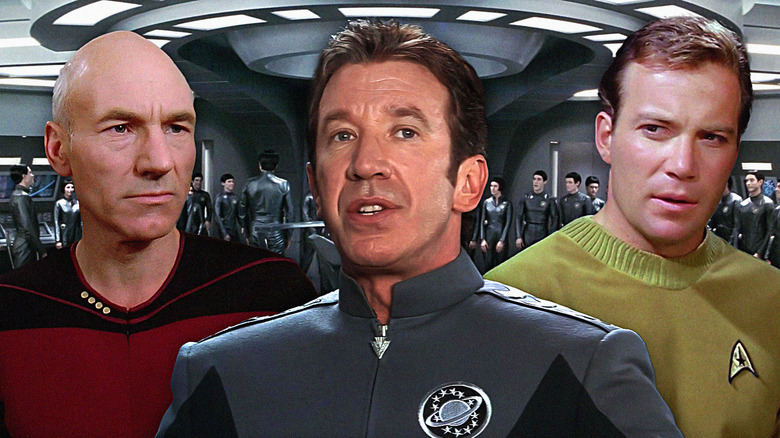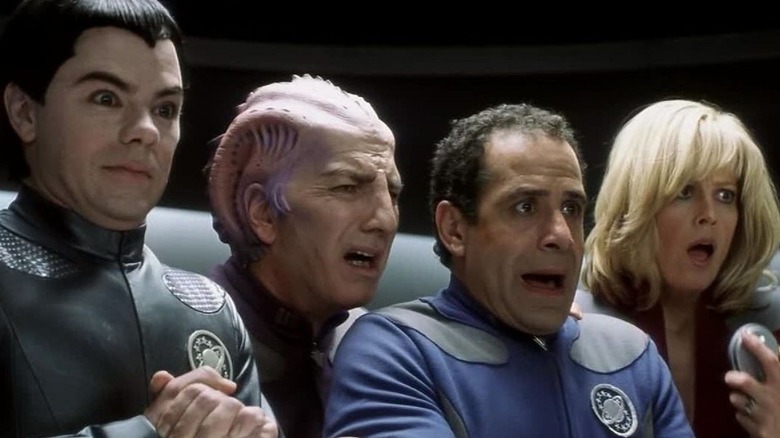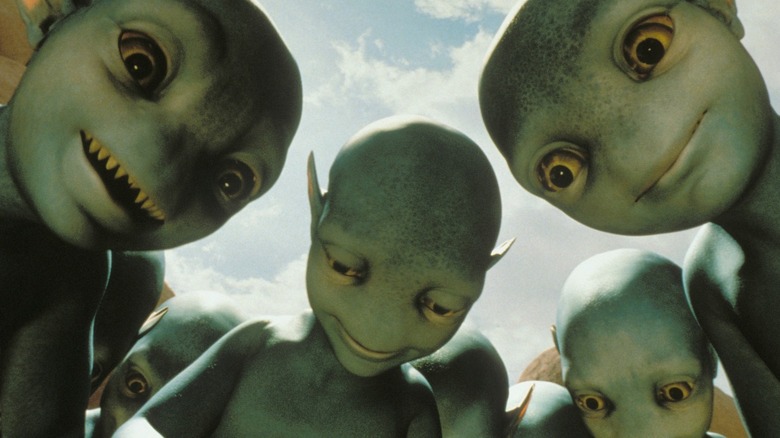How Star Trek Cast Members Really Felt About Galaxy Quest
Dean Parisot's 1999 sci-fi/comedy "Galaxy Quest" puts an interesting spin on the traditional "Seven Samurai" formula. In Kurosawa's classic, an impoverished village, regularly beset by food-thieving bandits, seeks out an army of samurai protectors to defend them. The villagers, however, have no money, and only manage to attract seven samurai in dire straits of their own. The samurai, however, find a certain kind of weary, bemused nobility in their job, and agree to stage the best possible defense they can.
In Parisot's film, the beleaguered villagers are innocent, defenseless space aliens who are being murdered off by genocidal reptile men. The aliens, called Thermians, travel to Earth looking for brave space-faring heroes to defend them, specifically, they are looking for the stars of "Galaxy Quest," a decades-old "Star Trek"-like sci-fi TV series. The aliens have been watching rogue TV signals for years, and came to assume that "Galaxy Quest" was nonfiction. The Thermians (which include Rainn Wilson in a small role before "The Office" fame found him) have since constructed their entire civilization around the series, right down to the ships and uniforms.
The cast of "Galaxy Quest," meanwhile, mourn their professional fate, having been typecast by their short-lived sci-fi roles. The lead actor of "Galaxy Quest" is Jason Nesmith (Tim Allen), and he has allowed his ego to take over his life (parallels to William Shatner abound). Gwen DeMarco (Sigourney Weaver) hates that she was only ever seen as the sex bomb on "Galaxy Quest," and Alexander Dane (Alan Rickman) loathes his alien character Dr. Lazarus. When the actors are kidnapped and forced to fight a real-life space battle alongside the Thermians, they have to determine if they can be real heroes.
It's a cute, funny film, with enough winking meta-commentary to keep Trekkies laughing jocularly at themselves. "Galaxy Quest" prods fandom while also vaunting it.
But how do the real-life "Star Trek" actors feel about it? "Galaxy Quest" posits that actors in a short-lived cult sci-fi TV series are uniformly egotistical, bitter, angry, resentful, and jobless. William Shatner, George Takei, and several others have talked about "Galaxy Quest" over the years, and they all seem to love it.
What did Star Trek's original cast members think?
In 2001, speaking to StarTrek.com, William Shatner was incredibly cheeky, pretending not to recognize the egotist character in "Galaxy Quest" that was very clearly meant to be him. He said:
"I thought it was very funny, and I thought the audience that they portrayed was totally real, but the actors that they were pretending to be were totally unrecognizable. Certainly I don't know what Tim Allen was doing. He seemed to be the head of a group of actors and for the life of me I was trying to understand who he was imitating."
Shatner said the only parallel he noticed was the one between Weaver and his co-star Nichelle Nichols, which is not a close parallel at all.
George Takei, speaking to SyFy (back when it was still called The Sci-Fi Channel), was amused by the bluster from the Tim Allen character, recognizing it all too well. Indeed, there was a scene in "Galaxy Quest" wherein Allen lost his shirt. The same happened frequently to Shatner, and Takei recalls the cast reacting with exasperation. He said that he "roared when the shirt came off, and Sigourney rolls her eyes and says, 'There goes that shirt again.' ... How often did we hear that on the set?" Takei also felt it struck too close to home, saying:
"I think it's a chillingly realistic documentary. The details in it, I recognized every one of them. It is a powerful piece of documentary filmmaking. And I do believe that when we get kidnapped by aliens, it's going to be the genuine, true 'Star Trek' fans who will save the day. ... I was rolling in the aisles. And Tim Allen had that Shatner-esque swagger down pat."
Takei is referring to a scene near the end of "Galaxy Quest," wherein the actors are able to contact Earth and only find "Galaxy Quest" fans willing to aid them. The fans actually hustle together quickly and make a sizable contribution.
The opinion of the 'Next Generation'
"Galaxy Quest" is a more pointed satire of the original 1966 "Star Trek" and its cast, but the cast of "Star Trek: The Next Generation" has also talked about the film. Patrick Stewart (Captain Picard), speaking to BBC One (via Snopes), found the film to be incredibly funny but also very loving. He also admitted that he wouldn't have gone to see the film if his "Next Generation" co-star Jonathan Frakes hadn't recommended it to him. When he did, though, he loved it, saying:
"No one laughed louder or longer in the cinema than I did, but the idea that the ship was saved — and all of our heroes in that movie were saved — simply by the fact that there were fans who did understand the scientific principles on which the ship worked was absolutely wonderful. And it was both funny and also touching in that it paid tribute to the dedication of these fans."
Meanwhile, Wil Wheaton, who played Wesley Crusher on "Next Generation" admitted that "Galaxy Quest" not only made him laugh, but it reminded him that "Star Trek" conventions could be fun. Wheaton, writing on his personal website, confessed that "Trek" conventions had lost their luster at the time. He wanted to find new acting gigs rather than just reminisce about what he had done as a teenager. "Galaxy Quest" made him realize that fans are great and cons are fun. He said:
"I loved Galaxy Quest.' I thought it was brilliant satire, not only of Trek, but of fandom in general. The only thing I wish they had done was cast me in it, and have me play a freaky fanboy who keeps screaming at the actor who played 'the kid' about how awful it was that there was a kid on the spaceship. Alas. When I saw 'Galaxy Quest,' I remembered how much fun I used to have at conventions, and I missed it. I missed the interaction with the fans."
Wheaton still goes to cons to this day.


